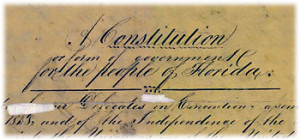The Constitution Revision Commission, which meets every 20 years, has proposed eight constitutional amendments — many combining multiple measures. Five single-topic proposals from the Legislature or citizens were already slated for the ballot.

Technically, the Constitution Revision Commission, which wrapped up more than a year of work in May, put eight amendments on the November ballot.
But in reality, the panel, which is convened once every 20 years, crammed 18 measures on the ballot. It just chose to stuff many of them into single, take-it-or-leave-it questions. “There’s a bunch of log-rolling here,” says Ken Bell, a former Florida Supreme Court justice who is now a partner at Gunster.
Commission members, appointed by the governor, legislative leaders and the chief justice of the Supreme Court, say they chose to “group” ideas together — even wildly disparate ones, like an amendment that pairs banning oil drilling with banning vaping — in order to avoid creating an excessively long ballot that could have dissuaded many people from voting at all.
But a lot of the bundled measures conveniently pair a handful of broadly popular issues with something far more controversial, suggesting that the real goal was to find ways to sweeten the pot for voters. “I think that’s precisely what happened,” Bell says. “I think that’s probably the result of the appointment process. Prior constitution revision commissions had more people with legal expertise and experience in constitutional law. Here, it was really more composed of politically active people.”
Here’s a closer look at the commission’s work:
Amendments 6-13 originate from the Constitution Revision Commission.
NO. 6
Rights of Crime Victims; Judges
Proposal

This amendment bundles three separate measures into one. The first would cement into the constitution a series of rights for people who are the victims of crimes. It’s part of a national campaign led by victims’ rights advocates who are pushing similar measures in other states. Among its guarantees is the right for victims to attend trials or any other public proceedings and to testify at pretrial release, sentencing or parole hearings. The second measure would raise the retirement age for judges from 70 to 75 but require them to step down immediately upon reaching that age rather than allowing them to complete their terms. And the third measure would forbid courts from deferring to a state agency’s interpretation when considering a challenge to a law or rule if the Legislature hasn’t spoken directly to the precise issue at hand. It’s a legal principle that courts have been following for years. It’s known as the “Chevron defense,” after a 1984 U.S. Supreme Court case involving the oil company.
Pro and Con
The victims’ rights movement was born out of the idea that courts have swung too far toward protecting the rights of criminal defendants and that victims deserve to have a stronger voice in the prosecution of their perpetrators. But some legal scholars and defense attorneys argue that giving victims a greater role in criminal proceedings turns them into emotional rather than legal proceedings — the modernday equivalent of public hangings — that interfere with the rights of defendants to fair trials. The strongest argument in favor of the changes to judicial retirement ages is that it would ultimately avoid situations where multiple judges on a single court have to step down at the same time — as will be the case when the terms of three Florida Supreme Court justices expire simultaneously. And critics of the Chevron defense have long argued that it has increased the power of unelected bureaucrats, while defenders argue that agencies have technical expertise in the fields they are regulating and thus are best suited to interpret laws and make policy decisions when there isn’t explicit legislative direction.
Political Context
The victims’ right measure was a priority for Gov. Rick Scott, who is running for U.S. Senate against incumbent Democrat Bill Nelson. Scott publicly embraced the idea a few weeks after the Feb. 14 mass shooting at Marjory Stoneman Douglas High School in Broward County. Meanwhile, many conservative legal scholars and free-market evangelists — including, most prominently, U.S. Supreme Court Justice Neil Gorsuch — have been itching to overturn the Chevron defense for years, claiming that it has contributed to the expansion of an innovationsquelching “administrative state.” And the commission, perhaps wary of sinking the whole package in controversy, wrote the amendment so that the judicial retirement changes won’t take effect until July 1 of next year — meaning it won’t have any effect on the looming Florida Supreme Court battle, in which Justices Barbara Pariente, Fred Lewis and Peggy Quince will have to retire on the same day in January that term limits force Scott out of the governor’s mansion.
NO. 7
First Responder and Military Member Survivor Benefits; Public Colleges and Universities
Proposal
This proposed amendment collapses three vaguely related ideas into one. One measure would ensure death benefits are paid out to first responders and members of the Florida National Guard who are accidentally or illegally killed on the job and orders the state to waive “certain educational expenses” for their children who pursue career certificates or higher education. Another would make it harder for universities to impose or raise fees on students by requiring at least nine votes to do so from a university’s board of trustees and at least 12 votes from the Board of Governors. The third would establish the Florida College System within the constitution alongside K-12 and State University System.
Pro and Con

Everybody supports first responders and the military. But while making it harder for universities to raise fees should help with college affordability, it will also limit the schools’ ability to raise money and invest in things like new facilities and faculty recruitment. And establishing the state college system in the constitution affirms that each college should be governed by a local district board of trustees and provides for statewide oversight by the state Board of Education as provided by Florida statutes. College advocates say the measure is designed to cement the current system of governance in place similar to the constitutional governance authority given the K-12 and the State University System.
Political Context
The university fee restriction is another nod to Scott, who has battled with colleges and universities for years over tuition and fees and who has pressed a package of anti-tax constitutional amendments this year to coincide with his run for Senate. The death benefits for first responders and National Guard members were included to get it all passed.
NO. 8
School Board Term Limits and Duties; Public Schools
Proposal

This is the amendment that will draw the most passion and fury, pairing two broadly popular ideas with one very controversial and partisan idea. The popular ideas: Imposing eight-year term limits on members of county school boards and requiring that civics lessons be taught in public schools. The controversial element: Exempting state-created charter schools from any oversight by the local school board.
Pro and Con
Voters seem to love term limits, but they come with consequences. While they promise more turnover and inject fresh blood into public office, they also lead to reduced competition in elections and shift power to unelected, but more knowledgeable, administrators and lobbyists. And while most may approve of teaching kids civics, each new instructional mandate from the state leads to a cut somewhere else because schools have only so much time and money. As far as the main debate: The practical effect of the amendment would allow the state to create a new entity that could approve new charter schools even over opposition from locals. Proponents, who have accused school districts of dogmatic opposition to charters, say charters add more competition, innovation and choice for parents. Opponents say it’s the latest step in an attempt to undermine public schools and privatize K-12 education.
Political Context
Getting this amendment onto the ballot is a big win for House Speaker Richard Corcoran, who has successfully advanced a sweeping, and incendiary, package of K-12 changes over the past two years. But it is also broadly supported by the rest of Florida’s GOP leaders, who have embraced the school-choice movement since Jeb Bush was governor. The campaign to pass the amendment is likely to draw significant financial support from the charter-school industry. But it will also face intense opposition from public school teachers and local school leaders. The 60% threshold will be tough.
NO. 9
Prohibits Off shore Oil and Gas Drilling; Prohibits Vaping in Workplaces
Proposal

Probably the oddest pairing on the ballot, this amendment bans offshore oil and gas drilling in Florida’s territorial waters — and vaping at indoor workplaces.
Pro and Con
Environmentalists have been lobbying for years for a drilling ban, both to guard against spills and to help in the broader movement to wean society’s addiction to fossil fuels. The oiland- gas drilling industry argues that fuel development is an important economic driver and that banning offshore drilling increases the country’s reliance on oil from other countries. Meanwhile, a 2002 constitutional amendment already bans smoking in Florida workplaces; supporters of adding e-cigarettes, which weren’t around when the original amendment passed, say it’s a logical extension to protect against second-hand contaminants.
Political Context
Though the oil and gas industry opposes this amendment, it’s unclear whether they’ll invest much money fighting what is likely to be a popular measure. This is an about-face for Florida GOP leaders, who have repeatedly refused to enact an oil-drilling ban over the years. But having it on the ballot gives Scott something green to tout to general election voters.
NO. 10
State and Local Government Structure and Operation
Proposal
A general government grab bag that collapses four issues into one, this amendment also pairs a few benign changes with a controversial change. It would establish a counterterrorism office within the Florida Department of Law Enforcement. It cements into the constitution a state Department of Veterans’ Affairs. It fixes in place the Legislature’s recent practice of beginning sessions in even-numbered years in January, rather than March. And the controversial part: It would force every county to make its sheriff, tax collector, property appraiser, supervisor of elections or clerk of courts positions elected offices, rather than appointed ones.

Pro and Con
There’s not really any opposition to the counterterrorism, veterans affairs or session start date changes. But there is plenty of opposition to the fourth provision in Miami-Dade County, where all of those county officer positions are appointed by the mayor rather than elected by the public. There are also a handful of other charter counties that have made some of those positions, such as clerk of the courts, into appointed jobs. Locals say the amendment undermines the principle of home rule; supporters of the changes argue elected officials would be more responsive to the public.
Political Context
This amendment is ultimately about the sheriff’s job in Miami-Dade County, which is the only one of Florida’s 67 counties where the top cop is appointed rather than elected. Some Miami politicians are upset that voters outside of Miami will decide how Miami chooses its sheriff.
NO. 11
Property Rights; Removal of Obsolete Provisions; Criminal Statutes
Proposal
This three-for-one amendment would repeal a 92-yearold provision in the constitution barring immigrants who aren’t eligible for citizenship from owning property, allow lawmakers to make some changes to criminal laws retroactive and erase a constitutional amendment ordering the construction of a high-speed train that voters had already voted to repeal.
Pro and Con
Florida was one of a number of states that adopted Alien Land Laws in the 1910s and 1920s — part of an effort to prevent Asian immigrants from owning property. Critics say it is a racist and antiquated relic, though Florida voters have rejected previous attempts to repeal it. Supporters of the criminal-law change say it would ensure that prisoners punished under older, stricter laws could have their sentences revised when the Legislature makes legal changes like eliminating mandatory minimum sentences. Florida voters approved a constitutional amendment ordering the construction of a bullet train between Orlando and Tampa in 2000, then voted for an amendment repealing that amendment in 2004. Nobody ever bothered to remove the actual words from the constitution, though.
Political Context
Asian-American groups, such as the Organization for Chinese Americans, have been pushing states to repeal alien land laws for years. The Greater Orlando Asian American Bar Association calls it the “last vestige of racism” in the Florida constitution. Meanwhile, some of the strongest support for allowing lawmakers to make criminal changes retroactive has come from gun-rights groups such as the NRA-aligned Unified Sportsmen of Florida. The push appears to stem from the hope that it might ensure that an NRAbacked law the Legislature passed last year — which made it clear that prosecutors, not defendants, must meet the burden of proof in pretrial Stand Your Ground hearings — can be applied retroactively.
NO. 12
Lobbying and Abuse of Office by Public Officers
Proposal
This amendment would prevent the governor, Cabinet members, agency heads, state lawmakers and local elected officials from getting paid to lobby their former colleagues for six years after they leave office. It would impose a similar ban forbidding justices and judges from lobbying the Legislature or executive branch for six years. It also requires stricter ethical standards for all public officers and public employees that must, at minimum, forbid them from abusing their positions in order to benefit themselves, their spouses, their children, their employer or their businesses.
Pro and Con
Most everybody at least publicly favors stronger ethics laws. But there is an argument that imposing restrictions on what public officials can do for a living after they leave office can deter otherwise strong candidates from pursuing public service at all.
Political Context
This amendment was a top priority for Corcoran, who failed to get a similar package of reforms through the Florida Senate. At one point, it looked like Corcoran might share the ballot with the proposed amendment by running for governor, but he recently opted not to run after concluding he couldn’t win.
NO. 13
Ends Dog Racing
Proposal

The proposal would outlaw greyhound racing in Florida by Dec. 31, 2020, though it would allow tracks to continue other pari-mutuel offerings such as card rooms and simulcast betting on dog races in other states.
Pro and Con
Animal-rights activists have been lobbying the Legislature for years to end dog racing, arguing that animals are treated inhumanely. The tracks counter that activists have made misleading claims and that they support thousands of jobs.
Political Context
Lawmakers have been wrestling for a long time about what to do about greyhound racing. But they remain paralyzed on the issue because every time a racing bill begins to advance, it collapses amid competing amendments pushed by a hornet’s nest of gambling interests. Getting this onto the ballot — assuming it survives a promised legal challenge from the Florida Greyhound Association — is also a win for greyhoundracing opponent Attorney General Pam Bondi, who can’t seek re-election because of term limits.
Amendments 1-5 originate from citizens or the Legislature.
NO. 1

Home Exemption
The proposal, which passed the Republican-controlled Legislature on a largely party-line vote, would exempt the portion of a home’s value between $100,000 and $125,000 from all non-school property taxes.
NO. 2
Non-Homestead Tax Cap

The bipartisan measure would make permanent a Save Our Homes-like tax cap for non-homestead property that prevents taxable values from growing more than 10% a year; if voters don’t approve, the non-homestead cap would expire in 2019. Proposals 1 and 2 combined would save taxpayers — but cost cities, counties and other local governments — more than $1.3 billion a year. State lawmakers are trumpeting the amendments as evidence of their commitment to tax cuts, although local government leaders note that legislators are forcing cities and counties — rather than the state itself — to deal with the fallout that will come in the form of cutting more services or raising tax rates.
NO. 3
Casinos

The result of a petition drive bankrolled by Disney and the Seminole Tribe, the proposal would prevent the construction of a casino anywhere in Florida unless first approved by voters in a statewide referendum. The overarching goal of the amendment is to prevent the construction of any Las Vegas-style destination resort casinos, which both Disney and the tribe view as competition.
NO. 4
Ex-Felon Voting

The proposal, which arose from a petition drive backed by Democratic-leaning activist groups, would automatically restore voting rights of felons once they have completed their sentences, except for those convicted of murder or sexual offenses. Because a disproportionate number of ex-felons are black, and because black voters are overwhelmingly Democratic, the campaign has enthusiastic support from Democraticleaning groups — and so far subtle opposition from Republican-leaning organizations.
NO. 5
Tax Hurdle

Gov. Rick Scott lobbied this measure through the Legislature just ahead of his U.S. Senate run. It would make it harder for future Legislatures to raise or impose taxes by requiring them to do so by a two-thirds vote, rather than a simple majority. Expect Scott to continually cite the amendment on the campaign trail, which he hopes will help defuse criticism that the state’s overall spending grew to historic levels during his tenure as governor.
See other stories from Florida Trend's July issue.
Get Florida Trend's July magazine – print or digital. Select from these options:
* offer valid for new subscribers only












